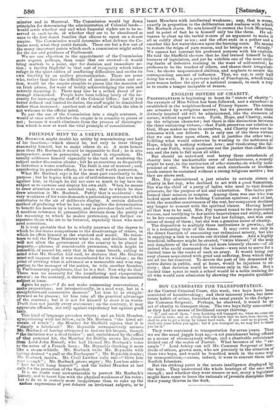BOY CANDIDATES FOR TRANSPORTATION.
AT the Central Criminal Court, this week, two boys have been convicted of housebreaking; and their innocent years, but inve- terate habits of crime, furnished the usual puzzle to the Judge— the Common Sergeant. Perhaps, he observed, it would be an act of charity to transport them. The two boys fully concurred; as they had no means of livelihood except thieving. " If," said one of them, " your Lordship will transport us, when we come oat we shall be men; and as nobody then will know that we have been thieves, we shall be able to get a living by honest hard work. If you send us to prison, we shall only come before you again; but if you transport us, we may live to thank you for it." They were sentenced to transportation for seven years. Thus we see the usual juggle kept up,—a set punishment being offered as a means of eleemosynary refuge, and a charitable subsistence filched out of the scales of Justice. What becomes of the " ex- ample " ? Lord Ashley can tell Mr. Common Sergeant of hun- dreds of others, grown men, who are precisely in the situation of these two boys, and would be benefited much in the same way by transportation,—onless, indeed, it were to convert them into Norfolk Islanders. But the striking point is the astute intelligence displayed by the boys. They understood the whole bearings of the case well enough • and whether they were sincere or not, many a legislator might have come to learn the rationale of juvenile discipline from these young thieves in the dock.


























 Previous page
Previous page